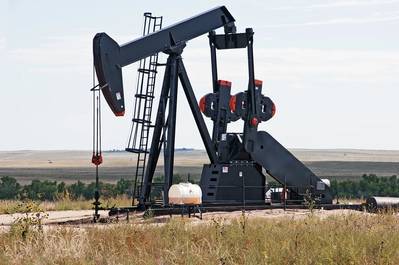US Crude Hits Highest Since 2014
Oil prices jumped on Wednesday, hitting their highest in more than three years on Wednesday after Saudi Arabia said it intercepted missiles over Riyadh and U.S. President Donald Trump warned Russia of imminent military action in Syria.
Both U.S. crude and global benchmark Brent traded at the highest levels since 2014 as geopolitical concerns overshadowed a surprise build in U.S. crude inventories.
"A bearish inventory report was quickly negated on word of intercepted rockets over Riyadh, which just adds to the recent spike in geopolitical tensions," said Anthony Headrick, energy market analyst and commodities futures broker at CHS Hedging LLC.
Prices began to rally as Trump threatened to fire missiles at Syria. Washington and its allies have been considering air strikes following a suspected poison gas attack last weekend.
Oil climbed further as broadcaster Al Arabiya said Saudi Arabia's air defense forces intercepted a missile over the capital Riyadh.
Brent rose $1.02 on the day to settle at $72.06 a barrel, having touched a session high of $73.09. U.S. crude futures rose $1.31 to settle at $66.82 a barrel, a 2 percent gain, having traded as high as $67.45.
Some major airlines were re-routing flights after Europe's air traffic control agency urged caution for aircraft flying in the eastern Mediterranean due to possible air strikes on Syria.
Trump has criticized Moscow for standing by Syrian President Bashar al-Assad.
"Russia vows to shoot down any and all missiles fired at Syria. Get ready Russia, because they will be coming, nice and new and 'smart!'," he wrote in a post on Twitter (TWTR).
Syria is not a significant oil producer, but any sign of conflict in the region triggers concern about crude flows across the wider Middle East. Reports of missiles in Riyadh exacerbated those worries, on top of existing concerns the United States could renew sanctions against Iran.
Commerzbank's head of commodity research Eugen Weinberg said oil market fundamentals "do not justify the current price, but unfortunately the market is focusing more on the politics and ignoring some of the warning signs, especially the hike in U.S. oil production."
Saudi Arabia Energy Minister Khalid al-Falih said his country would not let another supply glut surface, implying that the de-facto leader of the Organization of the Petroleum Exporting Countries (OPEC) would continue to withhold supply.
Not all oil market indicators suggest the price will continue to rally strongly, analysts said.
U.S. crude inventories rose by 3.3 million barrels in the week to April 6, according to the U.S. Energy Information Administration. The big build was a surprise after analysts had forecast a decrease of 189,000 barrels.
Despite oil's price spike after the rocket over Riyadh, the market remains focused on fundamentals, said Abhishek Kumar, senior energy analyst at Interfax Energy's Global Gas Analytics in London.
“Market participants will closely watch oil-production profile in the U.S., which is also expected to have a material impact on the outcome of the upcoming OPEC meeting in June,” he said.
(Additional reporting by Henning Gloystein and Amanda Cooper; Editing by David Gregorio and David Goodman)








